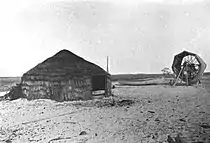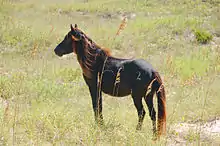Shackleford Banks
Shackleford Banks is a barrier island[1] system on the coast of Carteret County, North Carolina. It contains a herd of feral horses, scallop, crabs and various sea animals, including summer nesting by loggerhead turtles.[2] It is a tourist and beach camping site.[3]
Shackleford Banks is located near Harkers Island, North Carolina, Beaufort, North Carolina, and Fort Macon State Park, and is a part of the Cape Lookout National Seashore.
History

In 1713, the Virginia planter John Shackleford acquired several large tracts of land in Bath County, which included Shackleford Banks.[4] Among these was a grant of land containing seven thousand acres (28 km²).[5] This tract on the early maps was known as Sea Banks. It was then, and is now, part of the Outer Banks of North Carolina, Carteret County.
When John Shackleford first acquired his tract at Shackleford Banks, the island was known as "Cart Island", most likely after Carteret County. The last of the Virginia Shacklefords apparently sold their generations-old holding in 1805, when James Shackleford (the spelling of the name varies) of Carteret County sold his holdings on the Banks to Roger and John Shackleford of Georgetown, South Carolina, where a branch of the Virginia Shackleford family had eventually migrated. That deed specified "a certain parcel of land on Old Topsail Inlet, beginning at Whaler's Creek on said Banks and across to the sea; thence back to Old Topsail Inlet." (The Shackleford family traced their Virginia origins to the village of Shacklefords in King and Queen County.)
John Shackleford's garrison is listed in Colonial Records, January 19, 1712. "John Shackleford at the garrison at the Shackleford Plantation to be allowed to plant Corne on said Plantation, plant, tend and gather Corne during time they keep a garrison there." This shows troops were stationed at the garrison and the soil was tillable on the Banks during 1712. He was appointed to see "Every ship drawing eight feet of water anchoring at Shackleford Banks to charge three shillings six pence per foot".
In 1886, after a ship named the Chrissie Wright was wrecked on Shackelford Banks, some of the bodies of the drowned crew were buried in Beaufort.[6]
Shackleford Banks once had permanent residents. The now-abandoned settlement of Diamond City was located on the Banks, but the last occupants had relocated by 1902.[7]
Until 1933, Shackleford Banks was connected to the Core Banks. Barden Inlet was opened by the 1933 Outer Banks Hurricane, separating the Shackleford Banks from South Core Banks.[8]
Today

Shackleford Banks is known for the feral horses that roam there. The National Park Service closely monitors and studies these "Banker horses". They provide a glimpse into how horses lived in the wild before their domestication. The manner in which the horses arrived is still a mystery; legend has it that these horses are descendants of Spanish Mustangs that survived a shipwreck.
Visitors can take a ferry to the island from Morehead City, Beaufort, or Harkers Island. Since the horses roam the island, visitors may have to search for them. People ought to keep away from the horses, for they are feral and not accustomed to humans. If provoked, the horses may attack.
References
- Cape Lookout National Seashore - Natural Features And Ecosystems
- Cape Lookout National Seashore - Animals
- Cape Lookout National Seashore - Camping
- Shacklefords, Virginia The surname Shackleford was spelled interchangeably as Shackelford in early Virginia records. The only family of the name initially settled in the Virginia Tidewater at Shacklefords.
- Shackleford, History of Shackleford Banks, Core Sound Waterfowl Museum, 1995
- Remembering the Chrissie Wright
- Diamond City, North CarolinaDiamond City, North Carolina
- "Barrier Island Ecology of Cape Lookout National Seashore," NPS Scientific Monograph No. 9, Chapter 3
External links
- http://www.nps.gov/calo/ – The National Park Service official site for Cape Lookout National Seashore.
- http://www.nps.gov/calo/naturescience/horses.htm – Shackleford horse news, information, and photos from Cape Lookout National Seashore.
- http://www.shacklefordhorses.org/ – A non-profit organization that works with Cape Lookout National Seashore to maintain the herd of wild horses on Shackleford Banks.
- http://www.nps.gov/calo/parknews/newsreleases.html – Cape Lookout National Seashore's news report, including some announcements on births of horses.
- http://beaufortartist.blogspot.com/2007/01/remembering-chrissie-wright.html; Remembering the Chrissie Wright.
| Preceded by Cape Lookout Outer Banks |
Beaches of Southeastern North Carolina | Succeeded by Fort Macon |